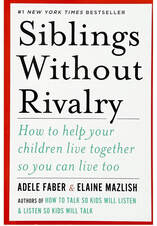The book is structured from the point of view of the author leading a support group of parents who are there to talk about the issues they are having with their children. Each class sets out to talk about a different subject, such as comparison of siblings, fighting between siblings, jealousy, etc. As the class progresses the author allows the parents to sometimes lead the subject into areas she hadn’t intended, but that are sometimes even more meaningful.
The subject of siblings does relate to childhood trauma in that sometimes a parent can create such animosity between children, or toward one child, that it really becomes a form of emotional abuse. In years past this probably wouldn’t have been recognized. There are many adults today who have suffered from a parent’s preference of one child over another. These wounds can be deep and can affect adult relationships. Some of the takeaways I gleaned from this book include the fact that parents can use comparisons in two ways. She can either praise one child to make the other child feel bad – usually trying to motivate the child to do better. Or a parent can put down one child while trying to make the other child feel better about himself. In either case, both children will suffer. The praised child suffers just as much as the put down child because comparison will destroy the potential joy of the sibling relationship. It will cause resentment among siblings that may last into adulthood. It is possible to motivate our children and to praise our children while treating them as an individual, not in comparison to someone else. There are many other subjects discussed, such as whether it’s necessary to always give every child the same things – it’s not, and how to handle frequent fighting – teach them to work it out themselves in a safe way. It also mentioned the affect that a sibling with special needs can have on the family and explored the best ways to include that child without having a negative effect on the siblings. In all, it was a very helpful book for parents. However, it could also be a helpful book for any adult who has had a difficult relationship with a sibling or parent. Many of these issues were explored in an easy-to-read way. If you are like me and don’t have time to read, you can also check out the audio book! Happy reading! Laura Shamblin, MD
0 Comments
On Friday April 26th, I had the privilege of attending the Resilient Payne County Next Steps Conference. Community advocates from all over the state of Oklahoma attended and spent time learning from each other what is being done in their communities to foster resilience and combat adverse childhood events. The conference was planned and executed by the fearless Dr. Carolynn MacAllister, retired professor of OSU Veterinary Clinical Sciences. She is a community advocate for Stillwater and the state of Oklahoma, and has been instrumental in passing bills such as the one that formed the Trauma Informed Task Force for the the State of Oklahoma. She had help with the conference from the Potts Family Foundation, which remains dedicated to fostering programs that promote early childhood safety and education. I was able to talk with attendees and pass out flyers for Trauma Informed MD, and since then there has been an increase in website traffic which should mean that more Oklahoma communities are becoming aware of the resources available at TraumaInformedMD.com.
On Thursday May 2nd, I had the privilege of spending an hour talking to the therapists at SoonerStart of Oklahoma County about Trauma and Resilience. SoonerStart is a publicly funded program that provides therapy services such as Speech Therapy, Occupational and Physical Therapy to children ages 0-3 who have been identified as having a developmental delay in one of these areas. By providing early intervention we can make it more likely that these children will catch up and succeed in school. Since many of the studied interventions for preventing ACEs have been supporting parents of young children with home visits by trained professionals, it is intuitive that these therapists are poised to provide support to parents, since they are already doing home visits. If we can provide training and resources to these therapists, they will be able to pass on that information to parents who may be struggling. I look forward to more training opportunities such as this with our excellent professionals providing services to children in our state. Now I am putting together a 2-3 hour training for Foster Parents who will be attending one of several free trainings put on by the Oklahoma Baptist Homes for Children One Such Child initiative this summer. OBHC provides free training while the children have fun attending a Vacation Bible School event. I'll be speaking June 5th at Eastwood Baptist Church in Midwest City, and June 14th at Capitol Hill Baptist Church as part of these trainings. If you are a Foster Parent and are interested in finding a training near you please go to https://www.obhc.org/FosterParentTraining. Blessings, Laura Shamblin, MD |
Laura Shamblin, MDEditor-in-chief of TraumaInformedMD.com Archives
April 2022
Categories |



 RSS Feed
RSS Feed